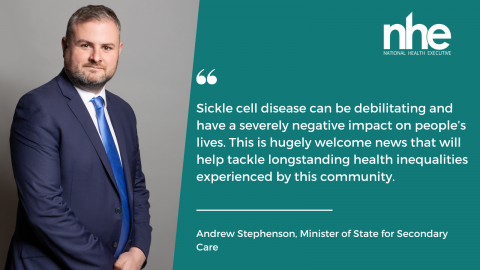Thousands of sickle cell disease patients are set to benefit from a new treatment option, after a price reduction prompted the National Institute for Health and Care Excellence (NICE) to recommend the drug, voxelotor.
Final draft guidance, published today, dictates that voxelotor (sold as Oxbryta by Pfizer) can be used on the NHS on its own as a treatment for sickle cell-caused anaemia, or in conjunction with the widely-used drug, hydroxycarbamide.
The announcement means that around 4,000 people could benefit from the new treatment, with voxelotor set to be immediately funded through NHS England’s (NHSE) Innovative Medicines Fund.
Previous draft guidance had outlined some uncertainties identified by NICE’s independent appraisal committee.
NICE says that the committee agreed the greater uncertainty in the clinical effectiveness estimates that underpinned the economic modelling for voxelotor could be accepted due to the significant hardships faced by sickle cell disease patients. This is in addition to a higher cost-effectiveness estimate than usual.
Director of medicines evaluation at NICE, Helen Knight, explained: “Throughout our appraisal of voxelotor the independent committee has always considered that it has the potential to address the need for effective treatments for sickle cell disease, as well as address NICE’s aim of reducing health inequalities.
“We are therefore delighted that the company has reduced the price of voxelotor to a level that properly reflects the uncertainty in the evidence and enables NICE to recommend it as a good use of taxpayer’s money.”

Taken once a day in the form of a tablet, the drug has been specifically recommended for the treatment of sickle cell anaemia in those aged 12 and over.
Clinical trial data shows that over half (51%) of the people who were given voxelotor experienced an increase in haemoglobin, while nearly three in four (74%) saw a noticeable improvement in how they felt.
NHSE’s CEO, Amanda Pritchard, hailed the news as one of the biggest breakthroughs in decades.
She said: “The NHS has worked hard to make this life-changing treatment available at a fair price for the taxpayer, as part of our wider drive to improve the quality and experience of care for sickle cell patients, and tackle the stigma and inequalities they have told me they face.
“By improving the quality of life and reducing the need for hospital care, this new treatment option also has the potential to free up doctors, nurses and other clinicians to better support other patients”.
Health leaders believe the treatment will especially lead to fewer blood transfusions and thus fewer hospital appointments.
To learn more about the latest innovations coming from the pharmaceutical industry, and how they could benefit the NHS, register for National Health Executive’s dedicated online conference, where leaders from across the sector will discuss everything from genomics to pathology.
Image credit: iStock



















